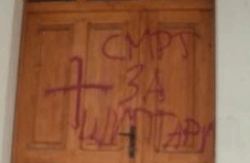Shqiptar
Shqip(ë)tar (plural: Shqip(ë)tarët, feminine: Shqip(ë)tare), Gheg Albanian: Shqyptar[1], is an Albanian language ethnonym (autonym), by which Albanians call themselves.[2] They call their country Shqipëria. During the Middle Ages, the Albanians called their country Arbëri or Arbëni and referred to themselves as Arbëresh or Arbënesh[3][4] and Αρβανίτες (Arvanites) in Greece. As early as the 17th century the placename Shqipëria and the ethnic demonym Shqiptarë gradually replaced Arbëria and Arbëresh.[5]
Origin theories
The origin of the ethnic name Shqiptar:
- Gustav Meyer derived Shqiptar from the Albanian verbs shqipoj (to speak clearly) and shqiptoj (to speak out, pronounce), which are in turn derived from the Latin verb excipere, denoting brethren who speak the Albanian language, similar to the ethno-linguistic dichotomies Sloven-Nemac and Deutsch-Wälsch.[2] This is the theory also sustained by Robert Elsie[6] and by Vladimir Orel.
- Petar Skok suggested that the name originated from Scupi (Albanian: Shkupi), the capital of the Roman province of Dardania (today's Skopje).[7] According to Petar Skok Albanian demonym Shkuptar (as in inhabitant of Skopje) changed to Shkiptar, which is still used among Arvanitis Albanians in Greece, and later to Shqiptar.
- Kristo Frashëri says that the ethnonym is derived from the albanian word shqip, who is first mentioned in the book Meshari of Gjon Buzuku (written in 1555), which originally meant to speak and understand the same language. From this word the term shqiptar was applied to all the albanians, which means he who speaks and understand the albanian language, argues Frashëri.[8]
- The most accredited theory, at least among Albanians,[9] is that of Maximilian Lambertz, who derived the word from the Albanian noun shqipe,or shqiponjë (eagle), which, according to Albanian folk etymology, denoted a bird totem dating from the times of Skanderbeg, as displayed on the Albanian flag.[7]
Use in South Slavic languages

The term Šiptar used across South Slavic languages (Cyrillic: Шиптар) is considered derogatory by Albanians when used by Slavs.[10][11] The official term for "Albanians" in South Slavic languages is Albanci.
References
- ↑ Fialuur i voghel Sccyp e ltinisct (Small Dictionary of Albanian and Latin), 1895, Shkodër
- ↑ 2.0 2.1 Mirdita, Zef (1969). "Iliri i etnogeneza Albanaca". Iz istorije Albanaca. Zbornik predavanja. Priručnik za nastavnike. Beograd: Zavod za izdavanje udžbenika Socijalističke Republike Srbije. pp. 13–14.
- ↑ Pinocacozza.it (Albanian) (Italian)
- ↑ Radio-Arberesh.eu (Italian)
- ↑ Kristo Frasheri. History of Albania (A Brief Overview). Tirana, 1964.
- ↑ Robert Elsie, A dictionary of Albanian religion, mythology and folk culture, C. Hurst & Co. Publishers, 2001, ISBN 978-1-85065-570-1, p. 79.
- ↑ 7.0 7.1 "ALBANCI". Enciklopedija Jugoslavije 2nd ed. Supplement. Zagreb: JLZ. 1984. p. 1.
- ↑ Frashëri, Kristo. Etnogjeneza e shqiptarëve - Vështrim historik 2013
- ↑ https://www.cia.gov/library/publications/the-world-factbook/geos/al.html
- ↑ Paul Mojzes (2011). Balkan Genocides: Holocaust and Ethnic Cleansing in the Twentieth Century. Rowman & Littlefield. p. 202. ISBN 978-1-4422-0663-2.
- ↑ Franke Wilmer (16 April 2004). The Social Construction of Man, the State and War: Identity, Conflict, and Violence in Former Yugoslavia. Routledge. pp. 437–. ISBN 978-1-135-95621-9.
It istrue that in Serbian the term was “siptar,” conceived by Albanians in Kosova as derogative as the ethnonym “Albanian” in Serbianis “albanac.”